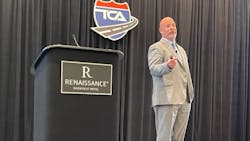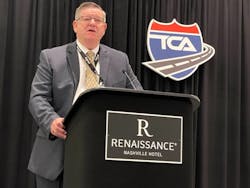Speed limiters divide truckload meeting safety stakeholders
NASHVILLE—Judging by the 14,000-and-growing comments posted to the Federal Register on the subject, opinion has been anything but muted about the federal government’s renewed push to require all Classes 7-8 commercial vehicles in the U.S. to be limited to an as-yet-to-be-determined speed. The speed-limiter proposal also had top billing here at a trucking industry safety conference.
A top federal government safety officer, Jack Van Steenburg, framed the issue starkly with statistics on June 6 at the Truckload Carriers Association (TCA) annual Safety & Security Meeting, followed by a regulatory update from David Heller, TCA’s government affairs vice president.
See also: ATA, OOIDA weigh in on FMCSA's plan to mandate speed limiters
“A lot of people are getting killed out on the highways,” Van Steenburg, executive director and chief safety officer at the Federal Motor Carrier Safety Administration (FMCSA), said before citing statistics that headline the Biden administration’s push, under the National Roadway Safety Strategy, to address speeding. FMCSA’s proposed speed-limiter mandate for heavy-duty trucks, published as a notice of intent on April 27, is part of this federal government full-court press.
The stats are stark and present a challenge to the trucking industry to be part of a solution.
According to widely circulated 2021 preliminary data from the National Highway Traffic Safety Administration (NHTSA) and cited by Van Steenburg, 42,915 people died last year in motor vehicle crashes—a 10.5% increase from the 38,824 fatalities in 2020.
Fatalities in crashes involving at least one large truck were up 13% in 2021. Also last year, 831 professional truck drivers or driver passengers died in accidents. Of those, Van Steenburg said, 43% inexplicably were not wearing seat belts. “People are consciously disregarding regulations,” he added.
“It’s getting to crisis level on our roads,” Heller remarked.
In his regulatory update at the June 6 session that followed Van Steenburg, Heller pointed out that a large percentage of truckload freight carriers—TCA’s membership—already govern the speeds of their commercial vehicles and, for safety, use other technologies such as adaptive cruise control (ACC), automatic emergency braking (AEB), and lane-departure warning systems.
The draft of the FMCSA rulemaking, which has yet to propose a top limit for Classes 7-8 trucks, calls on their speeds to be governed through their electronic engine control units (ECUs).
“The big question will be where speeds will be set at,” Heller remarked.
He also noted that the government is operating from the framework of a bill introduced in the House of Representatives in May 2021, the Cullum Owings Large Truck Safe Operating Speed Act, that would have required new heavy-duty trucks to be equipped with speed-limiting technology and for the devices to be installed on all used commercial vehicles built after 1992. That bill governed speeds at 65 mph—or at 70 with certain safety technologies aboard such as ACC and AEB. The National Roadway Safety Strategy also calls on the widespread adoption of AEB and lane-departure warning systems on commercial vehicles.
“Not everybody is keen on what speed limiters look like,” Heller added during his regulatory update. “We’re not afraid to put speed limiting in place if it’s going to save lives.”
See also: Opinion: Crash data defies logic of speed-limiter mandate
Owner-operators and smaller fleets are up in arms over the possible federal speed-limiter mandate. The trade group representing them, the Owner-Operator Independent Drivers Association (OOIDA), has come out forcefully against it. In May, the OOIDA Foundation noted that 78% of fatal crashes involving large trucks occur where posted speeds limits are 65 mph or below.
Meanwhile, larger fleets, ones represented by TCA and American Trucking Associations (ATA), have come out with more moderate stances and openness to working with FMCSA to craft a rulemaking that is friendly to the industry. ATA opposes governing trucks in the low 60 mph range. However, the trade group supports limiting them to 65 mph with none of the additional safety technology aboard and allowing them to run up to 70 mph with tech such as ACC, AEB, and lane-departure warnings.
FMCSA initially started its speed-limiter mandate process in August 2016. At the time, the effort, initially a proposed rulemaking between FMCSA and NHTSA, sought comment from the trucking industry and the public on limiting speeds on trucks at either 60, 65, or 68 mph.
Mixed feelings at TCA on speed limiters
Opinions among attendees varied at the TCA Safety & Security Meeting about the proposed FMCSA mandate.
Laura Wolfe’s fleet, Russellville, Arkansas-based Transco Lines, already uses lane assist and AEB safety technologies, she told FleetOwner in a June 6 interview. And all the trucks of Transco Lines already are governed, added Wolfe, the fleet’s VP of risk management.
Another attendee here, Konor Swedberg, safety director for San Antonio-based Double Diamond Transport, is on the opposite side of the issue. His drivers are owner-operators, and he has concerns that a speed-limiter mandate would have unintended consequences.
Swedberg said he’s concerned over geography; Texas is a large state, taking up to 12 hours to cross, and speed limiting will cause his long-hauling owner-operators to lose time, forcing them to take longer to carry loads along routes from San Antonio to Dallas and back. Also, he said, speed limiting would introduce safety hazards in real-world driving conditions.
“Speed is a huge safety issue, but you’ve got to think about everything else that is going on around the truck,” he told FleetOwner. “In Texas, our speed limits are 75 to 85 mph. If we limit that speed to 65, you’re going to have four-wheelers or the motoring public around you going 10 to 20 mph faster. At 100 yards, you’re on a truck in 3 seconds. They’re not paying attention, they’re distracted.”
The Federal Register has become the Wild West of reaction to the proposed speed-limiter mandate. Samples of the opinions, which are running overwhelmingly against the FMCSA rulemaking:
- “If you want more road rage and accidents, make it mandatory for all trucks to do 65. Only people that jump on a plane or a helicopter and don't share the same shitty roads with the peasants would think speed limiters are a good idea!”
- “Trucking companies and owner-operators should determine how fast they want their trucks to go, not the government. If trucks can only run 60-65 mph, it will severely limit our abilities to merge with traffic, as well as avoid hazards and collisions with other vehicles. Many times, I have had to speed up and move to the left lane to avoid another vehicle attempting to merge into my lane of traffic. Yes, you could slow down and let them over, but with a large truck that isn’t always the best course of action.”
- “Limiting speeds in trucks will not make them safer. All it will do is impede traffic in places where the truck speed limit is higher, making driving a truck more dangerous for the truck driver because the cars around it will be making aggressive maneuvers to get around it. This law is an overreach, if there is a problem with a few trucks speeding, you need to use the State Patrol to enforce the speed limit on those law-breaking drivers.”
- “This idea is horrible. You all need to ride in a truck for a week. You would then see the real side of trucks. Just because it looks good on paper, it doesn't mean it's safe. If all trucks are going the same speed, cars will get mad and try to get around no matter the risk they take. It's a very bad idea and will further cripple the industry.”
About the Author
Scott Achelpohl
Managing Editor
Scott Achelpohl is a former FleetOwner managing editor who wrote for the publication from 2021 to 2023. Since 2023, he has served as managing editor of Endeavor Business Media's Smart Industry, a FleetOwner affiliate.


